- Home
- Craig Schaefer
The Instruments of Control (The Revanche Cycle Book 2) Page 21
The Instruments of Control (The Revanche Cycle Book 2) Read online
Page 21
“Agreed,” Dante said.
“And once you’re making yourself comfortable in the governor’s manse, I expect we’ll have some things to talk about, trade-wise. I’m sure there are a few ways Mirenze can extend a friendly hand to Itresca.” He paused, only for a heartbeat. “And vice versa, of course.”
“Of course.”
“So,” the king said with a nod at Livia, “partners it is. Let’s free the lady and the three of us can continue this discussion over dinner in my hall. I’m freezing my balls off in here.”
“In three days,” Dante said. “She has to stay here for three more days.”
“Why?” Livia asked.
“So I can do my work down there. In the streets. We’re building a narrative, Livia. If we release you now, it’s…too easy. There’s no triumph, no sense of defeating the old order. The people don’t want it badly enough yet. They aren’t angry enough yet. I’ll stoke the fires of indignation, their sense of injustice, their fear that you’re being mistreated, and turn that into action.”
“Well, I’ll have some decent bedding sent up, and some books—” Rhys started to say. Dante held up his hand.
“No. She gets the same treatment as any other prisoner. Guards talk. If they see her being pampered, they’ll know something’s fishy.”
“Well, I’ll at least send her some decent food, instead of the slop—”
“No.”
“Blankets?”
“No.”
“It’s fine,” Livia said. “I can take it. Saint Elise spent ten years imprisoned at the bottom of an oubliette. I can endure three days.”
“Just remember the better things to come,” Dante said, gathering up his letters and safely stowing them in his vest pocket, “Keep watch out that window, and look to your flock waiting below. They’ll remind you.”
CHAPTER THIRTY-FIVE
Felix stood on the front porch of the Marchetti estate, in the shadow of a tan marble arch lofted by tall, scalloped columns. As he waited, faces drifted through his mind. His father, his brother, his sister-in-law. He wondered how long their memories would stay fresh. Would he see them as keenly, remember their voices, the sound of their laughter, twenty years from now? Or would their memory dissipate over time, like smoke in the rain?
Today, at least, the dead were with him. He carried a token: his father’s bone-handled knife, hidden snugly in a velvet pouch on his belt.
The servant who answered the door was a balding man, compensating for it with an overgrown mustache that sagged like shaggy tree branches at the corners of his mouth. He regarded Felix with the air of someone who’d just caught a beggar rummaging through his trash.
“Yes?”
Felix showed his empty hands. “Good morning. My name is Felix Rossini, of the Banco G-R, and I’m here to speak with Lodovico Marchetti. Could you take me to him, please?”
“Quite impossible.” His nose wrinkled. “Signore Marchetti is in a meeting and has given orders not to be disturbed. If you’d like to return tomorrow—”
“I can wait.”
“I would prefer,” the servant said, “that you did not. He is likely to be unavailable all day.”
Felix had planned for everything in his confrontation with Lodovico. Everything but being shut out on the man’s front step. His lips tightened. As he began to turn away, a thought occurred to him.
“One question,” he said. “Has your master been visited by a foreigner of late? A Murgardt, about this tall, pale blond hair?”
The servant squinted at him. “That sounds like Simon. He’s no foreigner, though. That’s Signore Marchetti’s personal accountant. Murgardt blood, but he’s a second-generation Mirenzei.”
“Accountant,” Felix echoed. The word strained through a throat suddenly gone tight as drumskin.
“That’s right.”
“I’ve been…needing the services of a good accountant. Might he be here, by any chance?”
The servant shook his head with a faint frown. “I’m afraid not. No one’s seen him since that horrid explosion at the Ducal Arch. I don’t want to presume the worst, but…”
“It was a terrible thing, yes.” Felix stared, unblinking. “A terrible thing. Do you know where he makes his home?”
“He rents a room on the Via del Coregono. I don’t know the exact address, but if you ask around I’m sure someone knows him.”
Felix gave a stiff bow. He tried to say “thank you” but couldn’t force the words out. The servant watched him, curious, as Felix strode down the pebbled front drive.
* * *
“I must admit,” Lodovico said, “seeing you here is a bit of a surprise.”
Aita, sitting on the far side of his desk, crossed her legs and gave him a dazzling smile. The sun streamed through the window at Lodovico’s back and caught the gold in her hair.
“Why? Because you’re trying to murder my father?”
He almost dropped his wineglass. His fingers clenched around the crystal stem, gently setting it back on his desk.
“That’s a powerful accusation.”
“I like power,” she said. “And I like directness. You sent those cutthroats to kill my father. They failed. Badly. Then you laid a trap at the Ducal Arch.”
Lodovico’s stomach lurched. He cast a guilty glance at the broadsheet on the corner of his desk, the smeared print screaming the latest death count. Simon’s words echoed in his mind: there may be a tiny bit of additional damage.
“On the first count,” he said carefully, “you are correct. On the second, no. I believe I know who did, though I don’t have confirmation as yet. He was…overzealous. If I’d known what he was planning, I’d have stopped him. I was horrified when I heard the news.”
“You have boundaries.” Aita tilted her head. “Disappointing to hear that.”
“This is my city. My home. I may have innocent Mirenzei blood on my hands because of what that man did in my service.”
“And yet, if you’d killed us in the blast, it would have been entirely worth it.”
Lodovico stared at her. He lifted his glass, slowly, sipping at his tart red wine. He swirled it around his mouth and swallowed.
“Aita, may I ask you a candid question?”
“Of course.”
He set his glass down. “What sort of monster are you?”
“I am my father’s daughter,” she replied.
“You have a curious lack of anger about all this.”
“Anger is counterproductive. I’m all about the end results. Like the end result of our mutually beneficial alliance.”
“We don’t have an alliance,” Lodovico said.
“We do now. Aren’t you going to offer a lady a glass of wine?”
He nodded at the bar. “Please yourself.”
She rose, stretching like a cat, and strode across the office. Crystal clinked, chiming faintly, as she poured herself a measure of burgundy-colored wine.
“You want revenge against my family,” Aita casually observed, “for what happened to your father. How like a typical man. Vengeance is a balm to the ego, not the coin purse. I’ll spare you any further lecturing on that count.”
“Thank you, please do.”
She walked back with a glass in one hand and the open bottle in the other, leaning over the desk to refill Lodovico’s cup before sitting down again.
“But you aren’t a typical man, are you? You’re an extraordinary man. And extraordinary men do nothing by half measures.”
“What was that you said,” he asked, arching an eyebrow, “about balms to the ego? Don’t try to flatter me. It’s embarrassing.”
“You’re not convinced I respect you?”
“I’m not even convinced you have a soul.”
Aita chuckled. “I’d be more surprised than anyone to discover I do have one. I’ve gotten along quite well without the burden. What’s your scheme in the east? Pope Carlo, the new crusade. What’s the endgame?”
“And why would I tell you that
?”
“Because we’re partners now. I’m going to make an educated guess, based partly on observed facts, partly on my pet theories. Ready?”
Lodovico shrugged. “Go ahead.”
“You want more than revenge for your father’s death. You want to vindicate his life. I looked him up. Luigi Marchetti, firebrand. Patriotic rabble-rouser. He agitated for a free Mirenze.”
“And are you a patriot, signora?”
Aita sipped her wine. “I am thankful for the opportunities Mirenze affords me. But opportunities come at a price. I won’t insult you by telling you my father’s business—”
“Thank you for that.”
“—but his business, as it is, will soon be mine. You might well take this city for your own, Signore Marchetti, but Mirenze has two faces.” She held out her open palm, then turned it downward, keeping her hand level. “The side exposed to the light of day and the underbelly. The shadow side. And one cannot function without the other. You’ll need my help.”
“And if I refuse?”
Aita let her hand fall to her lap. “Then the mighty gears of commerce will grind to a halt. Goods will pile up, rotting on untended docks. Guards who once looked the other way will search every wagon like a miner sifting for gold dust. Merchants who depended on the old order, an order carefully built on institutionalized bribery and casual graft, will take their business elsewhere. Mirenze, the hallowed City of Coins, won’t have a single bent copper to its name. You’ll be a bankrupt duke on a tin-pot throne.”
Lodovico stared at his glass. His fingers rapped the edge of his desk, softly drumming as he thought it over.
“You make a compelling argument.”
“Thank you,” she said. “I do practice.”
“And what do you get out of this…partnership?”
“Money and power,” Aita said.
“And nothing else?”
“I like money and power.”
Lodovico barely stifled a snort of disgust. He scooped up his wineglass, waving it at her.
“Truly? You desire nothing greater? You have no grand ambitions, no dreams? Don’t you want to leave your mark on the world?”
“I read a book last month, in my father’s library. It was a history, rather dry, about the fourteenth monarch of Belle Terre. He was a driven man. No, beyond driven. He expanded his nation’s borders threefold. Filled the treasury’s coffers with plunder and profit. Raised up breathtaking monuments across the land. He was so beloved by his citizens that when he died, people threw themselves to the dirt and wept for days.”
Lodovico furrowed his brow. “What’s your point?”
“That centuries later his kingdom has been conquered, there’s dust in the coffers, and his monuments lie shattered and broken. And this man, this great man, who all leaders should look to emulate and learn from…tell me, Lodovico, do you know his name?”
“I regret, signora, that I do not.”
“And in the centuries to come, no one will remember yours either. History will march past you. Time will forget you. All that we do and all that we are is built upon a pillar of sand. Try as you might, the tide will always wash in eventually and knock it all to the ground.”
“You,” Lodovico said, “are a hollow woman.”
“Perhaps.” She held up her glass, studying her wine in the light. “But I am also correct. Despise me if you will, but don’t let your feelings blind you to the cold, hard facts. You need my help. All I ask is my rightful share. Here, I’ll show my good faith. Want to know a secret?”
“I’m listening.”
“Your caravan of steel, your shipment of weapons for the good little crusaders? It’s about to go missing. My father aims to steal it, then ransom it back to you.”
Lodovico leaned back in his chair. He studied her in silence.
“You have plans for your father, I take it?”
She put her free hand to her breast, bowing her head in mock solemnity.
“Allow me, Signore Marchetti, to be the humble instrument of your vengeance.” She looked up, a soft giggle escaping her lips. “And mine, of course.”
He shifted in his chair, leaning one forearm against his desk.
“If we’re going to do this, there’s one more obstacle to remove. Your new husband.”
“Felix? I can control Felix.”
“I wouldn’t bet my life on that. Sooner or later he’ll connect me to the misfortunes he and his family have suffered. That’s a risk I can’t take. A variable I can’t account for.” He drummed his fingernails on the desk, pensive. “Felix must die. I’ll make the arrangements, but I want your agreement.”
Aita uncrossed her legs and stood, resting her glass on the edge of Lodovico’s desk.
“I’ll do you one better and take care of him myself. I’ll make a rather fashionable widow, I think. Out of idle curiosity, I must ask: your man, the…overzealous one?”
“Simon,” Lodovico sighed, snatching up his glass and tossing back a swig of wine. “If we’re all very lucky, he died in the explosion.”
“And if he didn’t?”
He didn’t answer right away. He turned his chair to gaze at the sunny, rolling lawns outside the office window.
“We grew up together. The best of friends. There was always something…off, though, in his mind. Like a miswrought cart wheel. Rattling as it rolls, ever so softly, just enough to warn you that one day it might break off and fly free. Everything I’ve done, I’ve done for this city. For its people. The very idea that he’d cause a massacre here…”
Lodovico shook his head. He turned back to Aita.
“He was a faithful hunting dog, but he’s turned rabid. And if I ever see him again, I’ll slit his throat from ear to ear. It’s the merciful thing to do.”
“A satisfactory answer,” she told him.
CHAPTER THIRTY-SIX
Mari and Nessa rode side by side on the driver’s perch of their wagon, guiding the horses down a broad dirt road. Sunlight filtered through the gnarled black limbs of trees thirty feet tall, and every gust of crisp afternoon air sent a fresh litter of bright orange leaves across their path.
A stray leaf landed in Mari’s ragged blond hair and stayed there. Holding the reins loosely, Nessa glanced sidelong at her companion. Mari didn’t move to brush the leaf away. She didn’t move at all.
She hadn’t spoken since they left the cabin.
“Careful, someone’s liable to confuse you with a tree.” Nessa plucked the leaf from Mari’s hair and tossed it aside. “There, that’s better.”
Mari mumbled something.
“Hmm? What’s that?” Nessa asked.
“I should have been there.”
“Werner,” Nessa said, “died in an ambush. He never had a fighting chance. They wouldn’t have given you one either. If you’d been there, you both would have died, and me right after you.”
Mari blinked bloodshot eyes. There weren’t any tears left in her. She had wailed until her throat went raw, and now nothing remained but a gray void in her chest, under a leather breastplate still spattered with dried blood.
“Werner…he changed my life. He saved me. He taught me everything I know.”
“I highly doubt that. No disrespect to the man, but you don’t give yourself nearly enough credit. And no one—now listen to me, Mari, this is important—no one in this life can save anyone else, and no one will. You have to save yourself.”
“I killed those men.” Mari sounded like she didn’t believe it, like it was all a story and she was trying to convince herself it was true. “I butchered them.”
“Yes.” Nessa glanced back. The ax, streaked with dried gore, lay in the wagon bed behind them. Carefully placed right where Mari would see it every time she turned around. A clump of black hair still clung to the edge of the blade. “You did well. Those men were pigs, less than pigs, and they deserved to die. You know that, don’t you?”
“I murdered them.”
“Yes. And if we’d gone to the aut
horities, they’d have walked free. You honored Werner’s memory. You honored him by bringing justice to his killers, justice only you could deliver. If that’s not the behavior of a true knight, I don’t know what is.”
Mari shook her head, slow. “I broke the law. I deserve to be punished.”
Nessa reined in the horses. They trotted to the side of the road, just along the tree line, and the wagon came to a stop. She turned on the perch, shifting her knees to face Mari, looking her in the eyes.
“You are a knight aspirant, bringing law to a lawless land. You have that authority. You have that right.”
“How?” Mari blinked at her. “Who gives me that right?”
Nessa chuckled and stretched out her hand. She swept it across the trees, cupping her fingers as if to grasp the sky.
“This. Nature. Nature, in all its savage and cruel glory. Stop thinking of them as men. They were beasts.”
“Then what does that make me?”
“A warden of the wood, of course. They defiled these wild lands with their filth. You purified them. Exactly as a knight should. But now you’re running away from a sensation you should be embracing. You’re making yourself feel guilty, forcing yourself to wallow in regret because you’re afraid to face the truth.”
Mari whispered her response in a voice heavy with dread.
“What’s the truth?”
“That when you were killing those men,” Nessa said, “you enjoyed it.”
“No.” She waved her hands, shaking her head, sliding away from Nessa on the perch. “No, that’s not—”
Nessa reached out and touched two fingers to Mari’s shoulder. Mari fell silent, petrified, like a deer facing a hunter’s arrow.
“Mari,” Nessa said softly, “never lie to me.”
Mari couldn’t speak. Her lips twitched, her throat clenching and unclenching as she tried to swallow.
“You were acting as a knight should,” Nessa said. “Those men needed to die, and killing them doubtlessly saved many, many innocent lives. You did nothing wrong. So why shouldn’t you take pleasure in your work? Do you think pleasure is evil?”

 Right to the Kill (Harmony Black Book 5)
Right to the Kill (Harmony Black Book 5)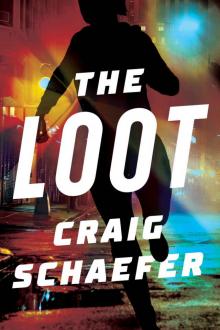 The Loot (Charlie McCabe Thriller)
The Loot (Charlie McCabe Thriller)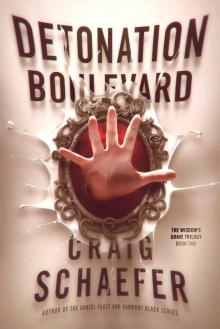 Detonation Boulevard
Detonation Boulevard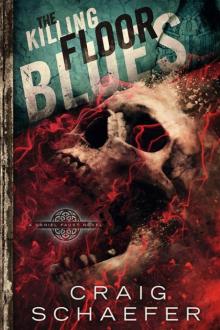 The Killing Floor Blues (Daniel Faust Book 5)
The Killing Floor Blues (Daniel Faust Book 5)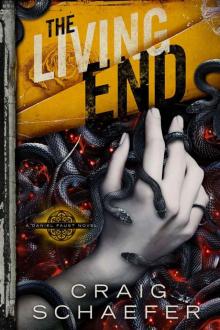 Daniel Faust 03 - The Living End
Daniel Faust 03 - The Living End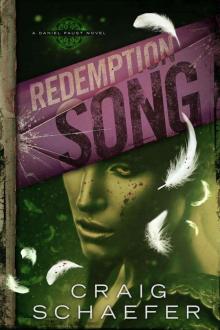 Redemption Song (Daniel Faust)
Redemption Song (Daniel Faust) Harmony Black (Harmony Black Series Book 1)
Harmony Black (Harmony Black Series Book 1) Wisdom's Grave 01 - Sworn to the Night
Wisdom's Grave 01 - Sworn to the Night Cold Spectrum
Cold Spectrum Bring the Fire (The Wisdom's Grave Trilogy Book 3)
Bring the Fire (The Wisdom's Grave Trilogy Book 3)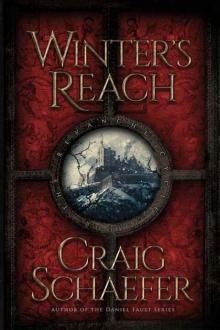 Winter's Reach (The Revanche Cycle Book 1)
Winter's Reach (The Revanche Cycle Book 1) Sworn to the Night (The Wisdom's Grave Trilogy Book 1)
Sworn to the Night (The Wisdom's Grave Trilogy Book 1) The Instruments of Control (The Revanche Cycle Book 2)
The Instruments of Control (The Revanche Cycle Book 2)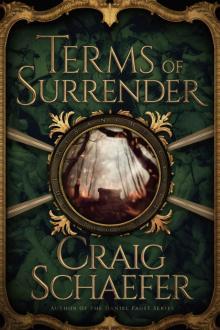 Terms of Surrender (The Revanche Cycle Book 3)
Terms of Surrender (The Revanche Cycle Book 3)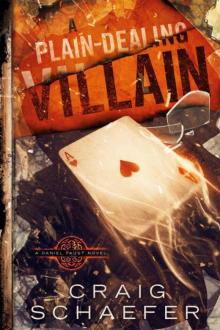 A Plain-Dealing Villain
A Plain-Dealing Villain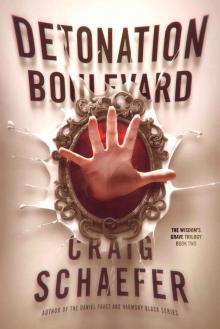 Detonation Boulevard (The Wisdom's Grave Trilogy Book 2)
Detonation Boulevard (The Wisdom's Grave Trilogy Book 2)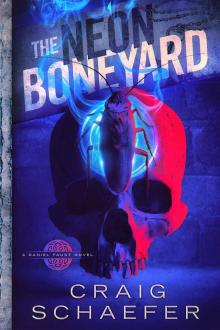 The Neon Boneyard
The Neon Boneyard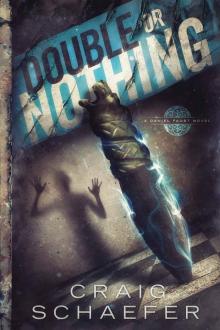 Double or Nothing (Daniel Faust Book 7)
Double or Nothing (Daniel Faust Book 7) The White Gold Score (A Daniel Faust Novella)
The White Gold Score (A Daniel Faust Novella) Sworn to the Night
Sworn to the Night